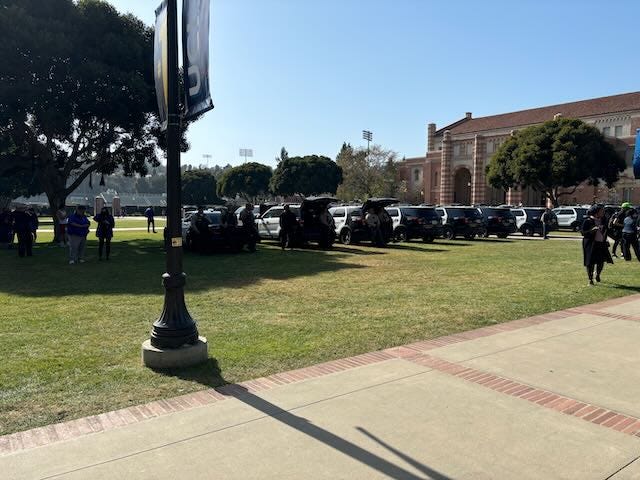Episode 8: From the Sea to the River
The Movement is at a Fever
Hi friends,
I debated whether to write this piece at all, but I know I needed to get this out of me in some way, in some manner. Rafah still burns as I type.
Vivek.
The student encampments bring fresh air in a world of complacency and hegemony. But I didn’t think their destruction would be a betrayal.
I know that Palestinians are dying, dead, and that people are forgetting. That the war in Gaza continues regardless of international pressure, international courts, international denunciations. It’s a perversion, this genocide.
Since October, I have out of necessity forced to slide the genocide out of view when I work, or am with my family, or doing the array of unceasing, mundane tasks that busy me. Then, the destruction of Palestinians snaps back to the center, and I grieve and hurtle out of time and space once again.
The photos of dead babies is too much for me to look at, and yet I look because if I can’t look, then how do I expect anyone else to.
Because we hope that if others look, they will feel. But that’s not happening. And I’ve been wondering why.
Before the encampments, I was a mere witness to the genocide. According to Fargo Nissim Tbakhi, witnessing discharges our obligations and provides us with catharsis.
In other words, watching “makes witnesses of us, and nothing else.”
When I see dead Palestinians, I feel the horror. Sometimes I swipe away quickly. But after I put the phone away, Gaza slides out of my consciousness until snapping back soon after.
And until recently, I kept doing those minor things - donating, protesting, talking - to support Palestinians. Things that feel like nothing in the actual doing of them but with the hope that if enough people do them, that can turn into something real.
I remember feeling something similar when it came to thinking about “reduce, reuse, recycle” in high school. I wrote an essay about how that motto felt cheap and ineffective. Perhaps I was prescient, or perhaps I simply felt the irrelevance of my action in the face something so out of scope, so not of my own making.
Before the encampments, I knew that fighting settler colonialism needed more than what we’ve been doing. More than the stark and fervent demand that Palestinians be recognized, that they be alive, that they be free.

And then, the students rose up at universities everywhere. They made concrete what kinds of societies they wanted to live in, with free food, free housing, free education. All convened despite, and because of, the hardened, difficult, destructive world that we all live in.
When I saw the tents in Los Angeles, I should have known what was coming. Knowing the history of LA’s unhoused whose tents meet the inevitable fate of a militarized police.
At UCLA, the Governor called in California Highway Patrol, the Los Angeles Mayor called in the Los Angeles Police Department, and the Chancellor called in University of California Police Department and authorized all of what happened. These forces spent the entire day around the perimeter of the encampment, drinking coffee and shooting the shit. Reveling in the banality of the sun-drenched day in Los Angeles, their attack vehicles parked in rows on the lawn, awaiting final orders while jockeying around. As if it was another day at the park.
Which maybe in some ways it was, for them.
And then in the middle of the night, the police attacked the encampment, with batons and rubber bullets. The same encampment where the night before the same police refused to protect them from Zionists and neo-Nazis, which were funded by Zionist celebrities.
Adding injury to injury.
Apparently, the Chancellor spent the evening watching the violent attack from the comfort of a second floor, watching the students he was deigned to protect while they fought back.
Apparently, the encampment leaders were told that the police were coming in to dismantle the encampment in the din of the night in order to protect the students from counterprotestors.
And then at UC Irvine, where the same thing happened and I learned that while one layer of the administration had summoned lines of police, another was out there convincing students to leave the encampment. The police circling the encampment and closing off access to the University so there could be no witness.
When we don’t have witnesses, we can’t even have catharsis.
And catharsis isn’t even the point. That’s a dereliction of our duties as people engaged in movement. Like Tbakhi says, we must bring people into movement, that writing on Palestine should be to “gathers others up with us” into this work so that our writing can turn material, can turn towards Palestine.
I know I should have expected university violence. I should have known it was going to happen like this at least some of time, at some of the encampments.
But to see it, hear it, feel it, and provide support in the after math is something else.
Because I work at one of these institutions, I have to pick up the pieces. And we have to challenge the how and why of their breaking. Because who else will?





Reality is often disappointing, but not surprising.
IMO, we need a revolution.